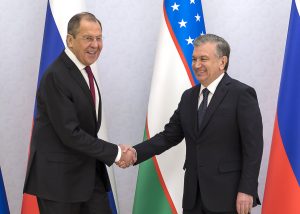Now-technically-acting Russian Foreign Minister Sergey Lavrov made a brief stop in Uzbekistan on his way back to Moscow from India, where he’d attended the Raisina Dialogue.
Lavrov’s Asia trip this week began with a stop in Sri Lanka on January 14 with a reported 42- member delegation. The Russian Foreign Minister met on Tuesday with Sri Lanka’s top officials, including President Gotabaya Rajapaksa, Prime Minister Mahinda Rajapaksa and Foreign Minister Dinesh Gunawardena. In remarks after meeting with Gunawardena, Lavrov highlighted growing trade ties and military cooperation.
On Wednesday, Lavrov put in an appearance at the Raisina Dialogue. At the annual conference, held in New Delhi, Lavrov lambasted the U.S. Indo-Pacific strategy. “Why do you need to call Asia-Pacific as Indo-Pacific? The answer is evident — to exclude China. Terminology should be unifying, not divisive,” he said.
Also on Wednesday, Russian Prime Minister Dmirty Medvedev and his whole government (including Lavrov) resigned as President Vladimir Putin unveiled plans for constitutional changes analysts have dubbed “sweeping.” The Medvedev government will remain working until a new government is appointed, starting with new Prime Minister Mikhail Mishustin (formerly head of the Russian Federal tax Service) who was nominated on January 15 by Putin and unanimously confirmed by the State Duma the next day.
Lavrov has been Russian Foregin Minister since 2004 and retained the job through several turnovers of the government under Putin. At 69, however, Lavrov could be looking to step out of his high-profile diplomatic post. But at least one diplomatic source told Al-Monitor’s Maxim A. Suchkov that Lavrov very well may stay in the position. “If we see this new government as transactional, he may as well stay. His style, his whole persona adds some special flavor to Russian diplomacy, so if he leaves it’d be a loss, but after all it’s the president who is in charge of top foreign policy decisions, not the foreign minister,” the source said.
Lavrov’s visit to Uzbekistan had been originally scheduled for January 12-13, presumably as an interim stop on his way to India, but was postponed to the return leg. The upheaval in Moscow didn’t dent his shine in Tashkent.
In Tashkent on Thursday, Lavrov was met at the airport by Uzbek Deputy Foreign Minister Ilhom Nematov and Russia’s Ambassador to Uzbekistan Vladimir Turdenev, among other officials. Lavrov then visite the Uzbek Ministry of Foreigh Affairs, the Tashkent branch of the Moscow State Institute of International Relations, and had a meeting with Uzbek President Shavkat Mirziyoyev.
One particularly hot topic between Russia and Uzbekistan is the question of whether Tashkent will join the Eurasian Economic Union. Lavrov reportedly commented that it was for Uzbekistan to decide. “As it wants to diversify its economic ties with the world. We are just playing a role of friends, strategic partners and allies… We provide information, but the decision is up to the president [Mirziyoyev].”
U.S. Secretary of State Mike Pompeo was supposed to pay a visit to Uzbekistan in early January, but that trip was postponed to a later, as-yet unannounced date, due to tensions in the Middle East. On January 1, the U.S. State Department announced that Secretary Mike Pompeo’s upcoming trip to Eastern Europe and Central Asia would be postponed “due to the need for the Secretary to be in Washington, D.C., to continue monitoring the ongoing situation in Iraq and ensure the safety and security of Americans in the Middle East.”
On January 3, the U.S. killed Iranian Quds Force Commander Qassem Soleimani in a drone strike on the Baghdad Airport road.

































